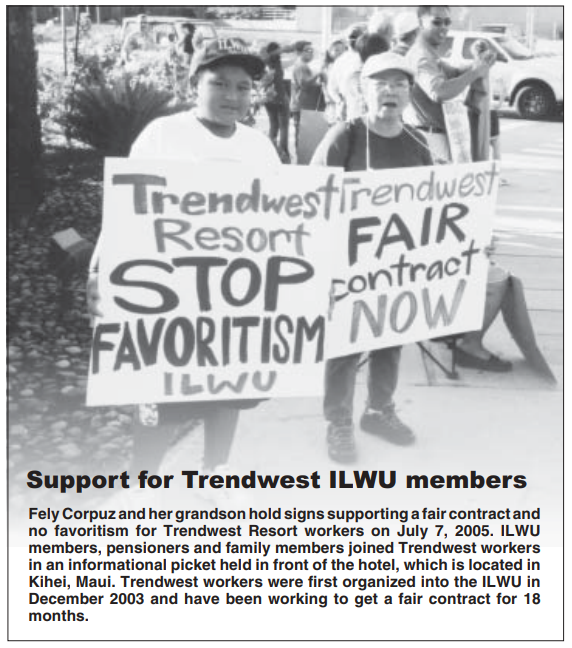Shop steward Zonette Tam had been working for 10 years toward a nursing degree while balancing her job and family life. Then on May 31 the ILWU Local 142 member received the news—she had won an AFL-CIO Union Plus scholarship. As a worker who helped organize her shop into the ILWU, the win was especially sweet.
“I had been on a career path to get a LPN [Licensed Practical Nurse] degree, but I got accepted into the nursing program at Univ. of Hawaii at Manoa and now this scholarship puts me over the top,” Tam said. “I can go for my RN and a bachelor’s degree.”
Tam came from a solid union family and has worked for eight years as a medical technician at the Straub Clinic and Hospital in Honolulu. Workers organized the clinic into Hawaii Local 142 in the late 1990s and got a first contract in 2001.
“I was at some of the first organizing meetings,” Tam said. “I was volunteered to be shop steward because I was the most verbal. Whenever there was trouble with a supervisor, they would come to me.”
The union victory meant Tam was eligible for the scholarship. But things were going rough for the mother of three when she applied last year.
“The past year was hard for me, but my kids were a big help in taking care of the little one while I attended school,” she said. “My husband was in Iraq, a week-end warrior became an active warrior for eight months. At one point there seemed to be no light at the end of the tunnel.
Of the 5,500 applicants, 120 won scholarships. These are offered annually through the Union Plus Education Foundation and paid for by the issuers of Union Plus credit cards.
To win the award applicants had to submit an essay of no more than 500 words describing their career goals, detailing their relationship with the union movement and explaining why they are deserving of a union scholarship. Grades and SAT scores were also considered. The judges were people from the American Assn. of Community Colleges, the National Assn. of Independent Colleges and Universities and the United Negro College Fund.
In all, Union Plus awarded $150,000 this year to students representing 40 AFL-CIO unions. Union Plus has awarded more than $2 million since 1992 to 1,300 students.

“Our members and their families are faced with expanding financial challenges and rising costs of higher education,” Union Privilege President Leslie Tolf said in a May 31 press release. “We are proud to sponsor the Union Plus program and help men and women in the labor movement realize their dreams for a higher education.”
The AFL-CIO created Union Privilege in 1986 to provide consumer benefits under the Union Plus label for current and retired union members and their families. It combines the purchasing power of 13 million members to provide discounts on car rentals and insurance, credit cards, ocean cruises, union-made clothing and many other things. Visit at www.unionplus.org.
Application deadline for the 2006 scholarship is January 31, 2006. The applications will be available in September 2005 on the website www.unionplus.org/scholarships. An application can be had by mail after September by sending a postcard with your name, return address, telephone number and your international union’s name to: Union Plus Education Foundation, c/o Union Privilege, PO Box 34800, Washington, D.C. 20043-4800.
Tam will continue working on-call after she begins nursing school in August. She had this to say to the members of AFL-CIO unions:
“Thank you from the bottom of my heart, it wouldn’t have been possible to further my education without this award. As we say, Mahalo.” ◆

Remembering ILWU leader Yasuki Arakaki
HILO—The ILWU lost one of its pioneer organizers on June 2, 2005 with the passing of Yasuki Arakaki of Keaau, Hawaii.
“He was a strong person who fought for the things he believed in, and he really helped to build the ILWU,” said former ILWU Hawaii Division Director and state representative Yoshito Takamine. “He had the passion to lift up working people, and he was the leader who brought sugar workers in Olaa together.”
Olaa Plantation on the Big Island of Hawaii was one of the first sugar plantations to be organized under the ILWU in 1944.
“I give him credit for organizing Local 148 (Olaa),” said Mrs. Mitsue Thompson, Arakaki’s good friend. “He was a tremendous force in the early years of the union, when we really needed his kind of leadership.”
Arakaki led Olaa workers during the 1946 sugar strike, the first successful strike against Hawaii’s sugar plantation owners. It was a strike which vastly improved the lives of plantation workers and changed the face of labor-management relations in Hawaii.
He continued to work for the union up until 1964, helping to organize strikes and serving on negotiating committees. During the McCarthy era “red scare,” Arakaki was labeled as “subversive” by anti-union redbaiters, but continued his work in organizing undaunted.
“He had the guts and the courage to lead when people were scared,” said Takamine.
During his years with the ILWU, Arakaki held several important positions—including president of ILWU sugar Local 148, Chair of the Board of Trustees of Local 142, and member of the ILWU’s International Executive Board in San Francisco.
In the mid-1960s he became a supervisor at Puna Sugar Company, eventually becoming its safety director. Arakaki went on to serve on the third Hawaii County Charter Commission, which drafted the Big Island’s County Charter in 1968, and was appointed to Chair the State Campaign Spending Commission in 1974.
Arakaki retired as a Deputy Clerk for the County of Hawaii.
After retirement, he continued to work for social justice. According to a statement by Jim Albertini, President of Malu Aina Center for Non-violent Education & Action, “Even in his 70s and 80s, Yasu joined protests against nuclear arms, U.S. policies in Central America, in support of striking workers, against the building of more prisons and the current U.S. war in Iraq.”
Yasuki Arakaki is survived by his sons Garfield and Carey, brothers Charles and Tommy, sisters Sueko Arakaki and Katsuko Matsuo, six grandchildren and seven greatgrandchildren. ◆
